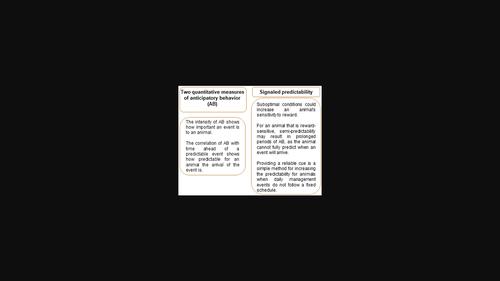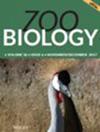Quantifying animals' perception of environmental predictability using anticipatory behavior
IF 1.2
4区 生物学
Q3 VETERINARY SCIENCES
引用次数: 0
Abstract
Animals under human care often experience predictable daily husbandry events, which can promote the development of anticipatory behavior. Previous research suggests even short delays in the arrival of a predictable, desired outcome can lead to negative welfare outcomes for animals. As such, providing reliable information to animals regarding the onset of important events may be a simple but useful method to support positive welfare. Here we evaluated the quantitative characteristics of anticipatory behavior of a California sea lion at the San Francisco Zoo in three situations (1) when the animal had accurate information about the occurrence of the event (temporally predictable training sessions), (2) when the information was semi-reliable (unscheduled training session), and (3) when a reliable signal was offered before unscheduled sessions. Results showed that providing a reliable cue resulted in a stronger temporal correlation of anticipation before the beginning of the unscheduled session, similar to the temporally predictable training session. However, providing a reliable cue did not reduce the intensity of the anticipatory behavior. We propose to take into account two aspects of the quantitative characteristics of anticipatory behavior: correlation with time until a desired event (correlation) and intensity, where the correlation indicates the ability of an individual animal to predict the occurrence of an event, and the intensity indicates the degree of sensitivity of the animal to reward. We discuss the implications for animal welfare and husbandry.

利用预期行为量化动物对环境可预测性的感知
人类照料的动物经常会经历可预测的日常饲养事件,这可能会促进预期行为的发展。以前的研究表明,即使是在可预测的预期结果到来之前的短暂延迟,也会给动物带来负面的福利结果。因此,为动物提供有关重要事件发生的可靠信息可能是支持积极福利的一种简单而有用的方法。在这里,我们评估了旧金山动物园的加州海狮在三种情况下的预期行为的定量特征:(1) 当动物获得有关事件发生的准确信息时(时间上可预测的训练课程);(2) 当信息处于半可靠状态时(未安排的训练课程);(3) 当在未安排的训练课程之前提供可靠信号时。结果表明,提供可靠的提示会导致在未安排的训练课开始前出现更强的预期时间相关性,这与时间上可预测的训练课类似。然而,提供可靠的提示并不会降低预期行为的强度。我们建议从两个方面考虑预期行为的定量特征:与预期事件发生前时间的相关性(相关性)和强度,其中相关性表示动物个体预测事件发生的能力,强度表示动物对奖励的敏感程度。我们将讨论其对动物福利和饲养的影响。
本文章由计算机程序翻译,如有差异,请以英文原文为准。
求助全文
约1分钟内获得全文
求助全文
来源期刊

Zoo Biology
生物-动物学
CiteScore
2.50
自引率
15.40%
发文量
85
审稿时长
6-12 weeks
期刊介绍:
Zoo Biology is concerned with reproduction, demographics, genetics, behavior, medicine, husbandry, nutrition, conservation and all empirical aspects of the exhibition and maintenance of wild animals in wildlife parks, zoos, and aquariums. This diverse journal offers a forum for effectively communicating scientific findings, original ideas, and critical thinking related to the role of wildlife collections and their unique contribution to conservation.
 求助内容:
求助内容: 应助结果提醒方式:
应助结果提醒方式:


